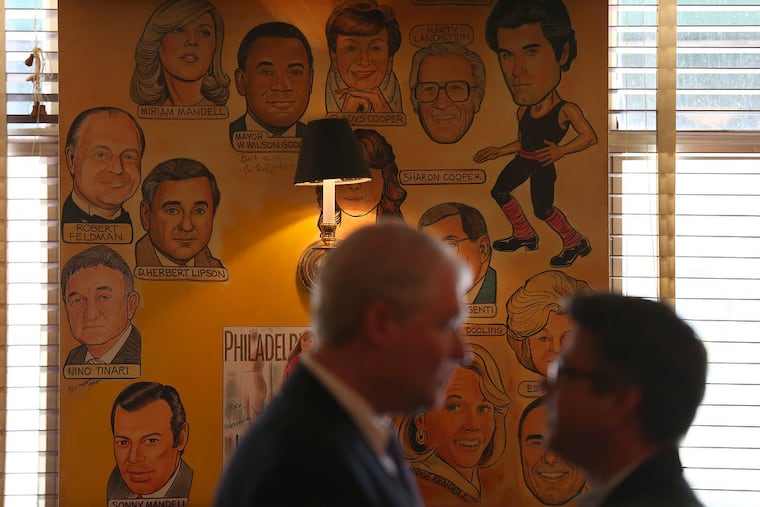A tale of two Docs: What labor is saying in light of the federal indictment of John Dougherty
Although he allegedly violated not only federal law but those of IBEW’s constitution, those who know and admire him say his actions can’t be perceived as anything but that of a hard-line advocate for workers.

>> UPDATE: Why Johnny Doc’s indictment is a problem for all Philly unions
It seemed like a case of two Docs.
On Wednesday morning, as they announced the result of a two-year federal investigation into John J. Dougherty and Electricians Local 98, officials painted a picture of Dougherty as a man with no regard for his union’s members, who stole hundreds of thousands of dollars from the local he led.
“Contrary to the public face, John Dougherty is not pro-union,” said FBI Special Agent in Charge Michael Harpster.
Although the indictment says Dougherty violated not only federal law but the International Brotherhood of Electrical Workers’ constitution — which says union funds must be used for the payment of “legitimate expenses” — those who know and admire him say his actions can’t be perceived as anything but those of a hard-line advocate for workers.
It’s because of Dougherty that Philadelphia’s construction industry is “one of the last bastions of protecting workers,” said Pat Gillespie, who ran the Building Trades Council for 34 years before Dougherty took over in 2016.
And then there are those whose opinions flipped after the indictment was released. Dave Delloso, a Teamsters business agent and a newly elected state representative in Delaware County, retracted his original pro-Dougherty statement after hearing allegations that Dougherty and Councilman Bobby Henon envisioned the city sweetened-beverage tax as retaliation against the Teamsters.
“If that’s the case, you know what? Let him burn,” Delloso said. “It’s a shame that they reach the pinnacle of their career, and then they’re eaten up by their own egos and end up hurting the labor movement.”
So which is the real “Johnny Doc”?
That’s just one of the questions raised by the 116-count indictment charging Dougherty and Philadelphia City Councilman and Local 98 employee Bobby Henon of embezzlement, bribery, and theft. The indictment has the potential to change the landscape of the region’s labor community, but most union leaders stayed quiet Wednesday, not returning calls for comment.
On the morning that federal officials announced the results of their investigation, the men filing in and out of the Electricians union hall on Spring Garden Street wouldn’t talk to a reporter, and spokesperson Frank Keel declined to make members available for interviews.
Local 98′s 4,700 members, according to Keel, stand “100 percent behind John Dougherty.”
Other labor leaders offered a window into the union culture that allowed Dougherty to operate without oversight, and the potential ramifications of the indictment. They suggested that organized labor has been unfairly targeted, especially when compared with corporations, and that Dougherty’s achievements now could be compromised.
“As soon as we’re getting an upper hand politically, the federal investigators seem a bit closer," said Philadelphia AFL-CIO president Pat Eiding when reached Tuesday. "That’s a travesty.”
It was Dougherty who transformed what Eiding called a “floundering union" into a political powerhouse, one that ensured high wages, good benefits, and a constant stream of work. Support crafts — steamfitters, plumbers, electricians — don’t normally hold the amount of clout that Local 98 does.
Now, said Tony Wigglesworth, who runs the Philadelphia Area Labor Management Committee and counts Dougherty as a friend, the indictment could impact Local 98′s ability to land contracts, because its reputation has been called into question.
Its outsize influence compared with other IBEW locals could be one explanation for why its national office, known in union parlance as “the international,” never intervened, experts said.
In the few times that Wigglesworth had been in the presence of both the international and Local 98, he said, Dougherty was never treated with anything but “respect bordering on awe.”
“Any time I was around the international, instead of questioning what John was doing, they wanted to know what he was doing for themselves,” Wigglesworth said.
Internationals generally respect local autonomy, Wigglesworth said. Intervening would not be easy, said Bill Fletcher, a former national AFL-CIO staffer who’s written three books on the labor movement.
“If you’re the president of a particular union, and one of your key supporters is powerful and corrupt, you have to decide: ‘What are the consequences of moving against them? Will I be successful? Is it really that much of a problem? If I remove them, what then happens?’ That’s the calculus these leaders have to grapple with.”
In a statement, a spokesperson for the IBEW said it first heard of the indictment from news reports Wednesday and was reviewing it.